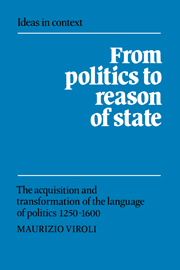 From Politics to Reason of State
From Politics to Reason of State Book contents
- Frontmatter
- Contents
- Acknowledgements
- Dedication
- Introduction
- 1 The acquisition of the language of politics
- 2 The philosophy of the city and the political man
- 3 Machiavelli and the republican concept of politics
- 4 Francesco Guicciardini: between politics and art of the state
- 5 The last glimmerings of civil philosophy
- 6 The triumph of reason of state
- Epilogue. Politics as civil philosophy
- Bibliography
- Index
- IDEAS IN CONTEXT
5 - The last glimmerings of civil philosophy
Published online by Cambridge University Press: 02 February 2010
- Frontmatter
- Contents
- Acknowledgements
- Dedication
- Introduction
- 1 The acquisition of the language of politics
- 2 The philosophy of the city and the political man
- 3 Machiavelli and the republican concept of politics
- 4 Francesco Guicciardini: between politics and art of the state
- 5 The last glimmerings of civil philosophy
- 6 The triumph of reason of state
- Epilogue. Politics as civil philosophy
- Bibliography
- Index
- IDEAS IN CONTEXT
Summary
By the close of the Medicean regime of 1512–27, the republican language of politics knew a new floridness. To a large extent, it was the product of Machiavelli's teaching, particularly the Discorsi, composed between 1515 and 1518–19, and the Art of war, published in 1521. Although the Discorsi were published only in 1531, Machia-velli's appeal for the restoration of the “vivere politico” found an attentive audience in the younger Florentines who attended the meetings at the Orti Oricellari. Traditionally a Medicean circle, the Orti Oricellari became, in the 1520s, a center of the republican opposition. Along with Machiavelli, Antonio Brucioli, Donato Giannotti, Jacopo Nardi, Filippo and Lorenzo Strozzi attended the gatherings, to discuss politics and the republic, rather than erudite questions. Their common Humanist education provided a fertile ground for the renewed republican ideals. Classical and Roman history nourished the aspirations for the restoration of the republic and the resurgence of communal self-government.
One of the most genuine representatives of the Humanist tradition was Antonio Brucioli. Born in the last decade of the fifteenth century, Brucioli was a pupil of the Neoplatonic philosopher Francesco da Diacceto. After the failure of the antiMedicean conspiracy of 1522, he fled to Venice and later to Lyon, where he completed his major work, the Dialogi della moralfilosofia, published for the first time in Venice in 1526. He returned to Florence in 1527 after the expulsion of the Medici. The new republican regime, however, looked on him suspiciously because of his connections with the aristocratic Alamannis.
- Type
- Chapter
- Information
- From Politics to Reason of StateThe Acquisition and Transformation of the Language of Politics 1250–1600, pp. 201 - 237Publisher: Cambridge University PressPrint publication year: 1992


